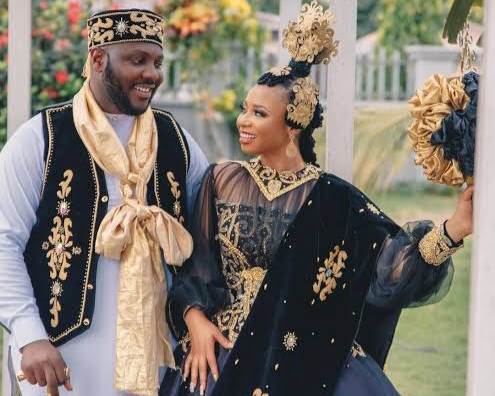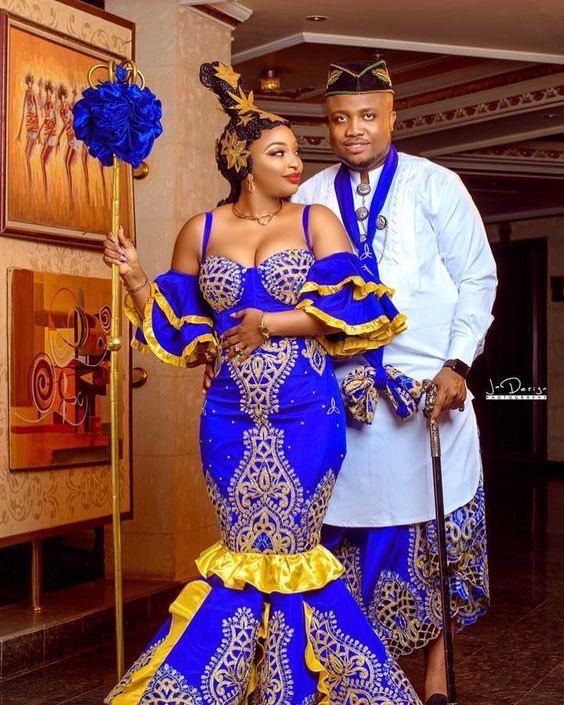Entertainment
Many Cultures, One Country: Traditional Weddings of Efik, Ibibio, Akwa Ibom and Cross River

Traditional weddings in Southern Nigeria are rich in color, music, and meaning. Among the Efik, Ibibio, and people from Akwa Ibom and Cross River states, marriage is a community celebration filled with deep respect for culture and family. These weddings include specific steps, unique dressing, and important gifts that carry meaning beyond material value.
Efik Traditional Marriage (Cross River State)
The Efik traditional wedding, also known as Mbopo, is a ceremony that celebrates the bride’s beauty, purity, and readiness for marriage. In the past, young women would be kept in seclusion for days or weeks to prepare them with teachings on cooking, housekeeping, and how to care for their future home. Today, this tradition is often symbolic and short.
The process begins with the groom’s family visiting the bride’s family to knock on the door and declare their marriage intentions. If the bride’s family accepts, they give the groom a marriage list, which usually includes palm wine, schnapps, crates of drinks, bags of rice, seasoning, stockfish, wrappers, salt, soap, and sometimes a goat or pig. These gifts are not just for show — they represent the groom’s ability to take care of the bride and honor her family.
On the wedding day, the bride often makes multiple appearances in different outfits. The most popular is the Onyonyo, a flowing dress made of velvet or lace, usually in bright or royal colors. She wears heavy coral beads on her neck, hands, and hair, and carries a stylish fan or staff. The groom wears a long white or gold shirt, a patterned wrapper called Usobo, and a matching cap with beads. During the ceremony, the bride walks around with a cup of palm wine, searching for her groom in the crowd. Once he drinks from the cup, the marriage is sealed.
Ibibio Traditional Marriage (Akwa Ibom State)

Ibibio couple
For the Ibibio people of Akwa Ibom, traditional marriage is called Ndo. The process starts with an introduction ceremony, where the groom’s family visits the bride’s family with kolanuts, palm wine, and soft drinks to ask for her hand in marriage. If accepted, they are given a list of items to bring for the traditional wedding. This list often includes bags of rice, salt, bottles of schnapps, cartons of malt or beer, soap, wrappers for the bride, gold or coral beads, shoes, umbrella, and sometimes a live goat or ram.
On the wedding day, the groom’s family arrives early, bearing the gifts on the list. They kneel to show respect and ask the bride’s family to accept them as in-laws. The bride is dressed in a George wrapper or lace fabric, styled with a fitted blouse, a head tie or crown, and traditional jewelry. Her look is completed with matching shoes and beads, representing beauty and royalty. The groom wears a long shirt with embroidery, a wrapper tied across his waist, and a cap — sometimes adding a walking stick for elegance.
Music, food, and dancing follow the formal parts. The bride may be asked to dance in front of her family and friends, showing her joy and pride. The gifts exchanged are symbols of peace, love, and readiness to build a home.
Akwa Ibom & Cross River Blend
Because the Efik and Ibibio people live close to each other, their wedding customs often overlap, especially in modern times. Some couples even mix elements from both cultures during their traditional marriage. A unique and fashionable outfit commonly worn across both states is the Ofong Ukod Anwang — a corset-style blouse with a wrapper, beads, and a beaded crown. This outfit blends tradition with modern beauty.
No matter the tribe, gift-giving remains a central part of these weddings. Items like stockfish, yams, drinks, palm wine, salt, meat, jewelry, and money are not only for the bride’s family but also for elders, siblings, and extended relatives. It’s a way to show gratitude and strengthen family ties.


